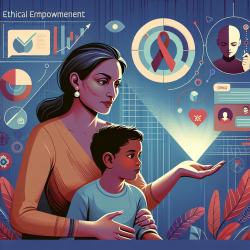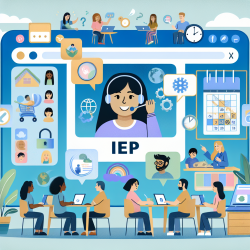Empowering Change: Ethical Insights for Speech-Language Pathologists
In the ever-evolving field of speech-language pathology, practitioners are constantly seeking ways to enhance their skills and provide better outcomes for children. One area that offers valuable insights is the ethical considerations surrounding health crises, such as the HIV/AIDS pandemic in Africa. The anthology "Ethics and AIDS in Africa: The Challenge to Our Thinking," edited by Anton A. van Niekerk and Loretta M. Kopelman, provides a wealth of knowledge that can be applied to our practice.
Understanding the Ethical Landscape
The anthology explores various ethical dimensions of the HIV/AIDS crisis in Africa, highlighting the importance of balancing individual rights with societal benefits. This is particularly relevant for speech-language pathologists working in diverse settings, including online therapy services like those provided by TinyEYE. The book emphasizes the need for a coherent ethical framework that considers micro, meso, and macro-level concerns, which can be adapted to our practice.
Micro-Level Concerns: Patient-Centered Care
At the micro-level, the anthology discusses the ethical considerations in doctor-patient relationships. For speech-language pathologists, this translates to ensuring informed consent and respecting the autonomy of our young clients and their families. It is crucial to communicate clearly and effectively, especially when working with children who may have limited understanding of their treatment.
Meso-Level Concerns: Community Engagement
The meso-level concerns focus on the ethical dimensions of community health and justice. Speech-language pathologists can draw from this by engaging with the communities they serve, understanding cultural nuances, and advocating for equitable access to therapy services. Online platforms like TinyEYE can bridge gaps in service delivery, especially in underserved areas.
Macro-Level Concerns: Global Perspectives
On a macro level, the anthology addresses global disparities and the impact of policies on health outcomes. For practitioners, this means staying informed about global health trends and advocating for policies that support the well-being of children worldwide. Understanding the broader context of health crises can inform our practice and enhance our advocacy efforts.
Encouraging Further Research
The anthology is a starting point for further exploration into the ethical dimensions of health crises. Speech-language pathologists are encouraged to delve deeper into these issues, conducting research that can inform practice and policy. By doing so, we contribute to a more comprehensive understanding of the challenges and opportunities in our field.
To read the original research paper, please follow this link: Review of 'Ethics and AIDS in Africa: The Challenge to Our Thinking' by Anton A. van Niekerk and Loretta M. Kopelman (Eds).










